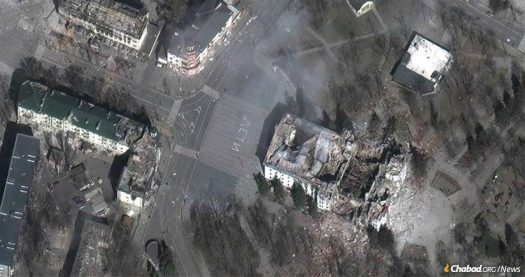
Tales From Mariupol: A Devoted Rabbi and a Devastated Community
by Bruria Efune – chabad.org
My husband first met Rabbi Mendel Cohen a few years ago in our shul in Beersheva, Israel. He had a great smile and energy about him. You knew at once that he is the kind of person who cared deeply about everyone.
They chatted, and my husband learned that Rabbi Cohen and his wife, Esty, were Chabad-Lubavitch emissaries in a seaside Ukrainian city called Mariupol and were in Beersheva with their children to visit her parents. My husband kept up with him over the years, and we developed tremendous respect for how the Cohens dedicated themselves to their community, and how it had grown under their guidance.
A little more than a month ago, in early March, my 5-year-old son was eagerly telling me about one of his new preschool friends.
“Did you know that some kids have two houses? A new boy in my class has a house here and another house so far away that he has to take an airplane!”
It was Rabbi Cohen’s son, and no, he doesn’t have two houses. At least 90 percent of Mariupol has since been turned to rubble. The Cohens’ home has suffered greatly, as has their beautiful new Chabad center, which serves as the city’s lone synagogue.
Mariupol was besieged so quickly that few residents were able to flee. But Rabbi Cohen had a leg surgery scheduled for mid-February in Israel, and with the Russian army looming at the border, he followed advice to take his whole family along. Just days later, the Cohens knew that the leg surgery and accompanying advice had quite likely saved their lives.
Rabbi Cohen got on the first flight he could to the Romanian border with Ukraine. There, he helped set up a hostel for refugees and tried to get any information that he could about his besieged community. Then he began researching dramatic rescue plans.

That’s when we saw a video interview with him; he looked entirely different. You could see that he hadn’t slept in days and had nothing on his mind other than his people back home in Mariupol. His voice gave away deep concern and fear of the worst while he spent every second trying for the best.

All day he went through his contact list, trying to reach people, and all day his calls went unanswered. The community WhatsApp and Viber groups—the latter a popular communication tool in Ukraine—remained silent, with no sign of anyone receiving his messages. “It felt like I was shouting in the middle of a cemetery and the only answer was silence,” Rabbi Cohen says.
Then, finally, he got a call. A group had hiked out amidst the artillery fire and past the Russian tanks. Miraculously, they made it to a village nearby, where they were able to charge their phones and get reception to call him. But they had nothing left other than their passports. They needed food, a vehicle and gasoline.
Thus began the field rescues, costing huge amounts of money to hire locals who knew the terrain and were unafraid of the war raging all around. But the Cohens would give anything to save each life, and around the world, people who understood did the same, and support began pouring in.
Here are some of their stories:
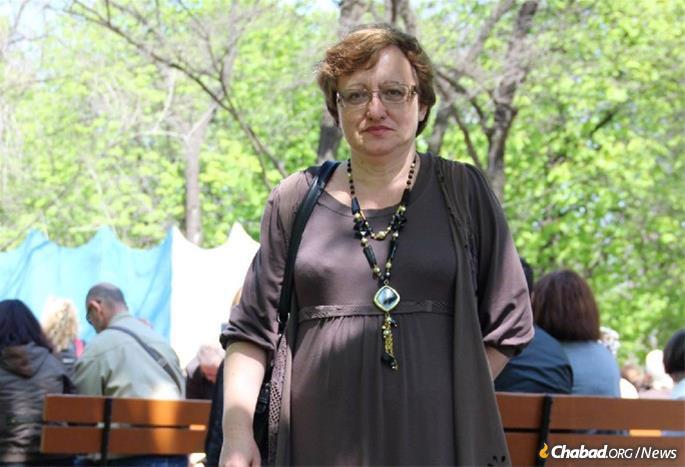
Tatiana’s Call
One day, Rabbi Cohen received a much-awaited call. It was Tatiana, a very active member of the community and a good friend.
Tatiana’s daughter had been a student in the community school and after graduating had left to continue her Jewish studies in Moscow.
On the phone with the rabbi, she was crying. She said she had been desperate to speak with him, so she climbed up to the ninth story of a building hoping for reception.
“Rabbi,” she cried, “I don’t think I’m going to make it. Please, take care of my daughter.”
Rabbi Cohen did his best to comfort her and begged her not to give up.
“We’re doing everything we can to get to you. We are praying for you. You will make it out and be with your daughter again—don’t lose hope!”
He hasn’t heard from her since.
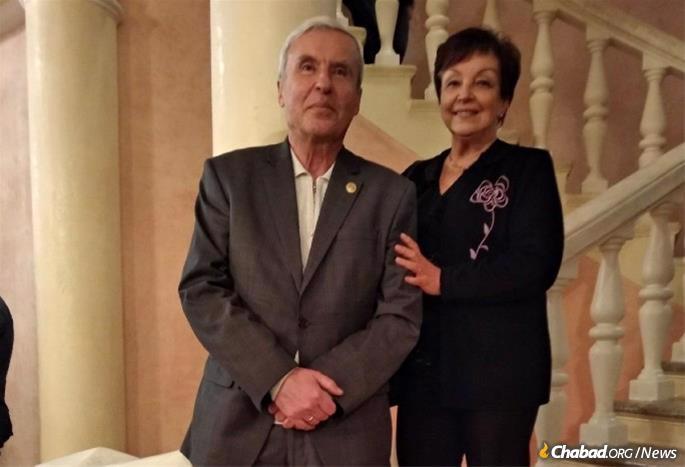
Boris and Irina
Boris Danziger was a founding member of the Jewish community, a professional soccer referee and a much-loved character. He frequented Shabbat meals at the Cohens and never missed a Passover Seder. Every year, he would lead the Kaddish ceremony for the 16,000 Jews of Mariupol who perished in the Holocaust.
Boris and his wife, Irina, have a son named Michael who lived in Israel. A few months ago, Michael had a baby, and the new grandparents excitedly told Rabbi Cohen of their plans to go meet their first grandchild.
That was also the last thing Boris discussed with Michael before they lost contact.
Michael called his parents’ phones nonstop all day for weeks. He reached out to anyone he knew who made it out of Mariupol. Finally, he found a neighbor who had seen them. The Danzigers’ apartment building had been bombed by Russian forces. The whole building went up in flames, but Boris and Irina were spotted running down to the basement.

It was March, and Mariupol was covered in snow. With no heating or electricity, it was a dangerous situation. Their incinerated apartment building was right near the Mariupol Drama Theater, where up to 1,500 civilians had gone to shelter, many of them children and elderly citizens. Some guessed that the couple had gone there, shortly before it, too, was bombed by the Russians. Some 300 people died in the theater.
Rabbi Cohen wouldn’t give up on them, and Michael never stopped trying to reach his parents. He kept calling and sending messages.
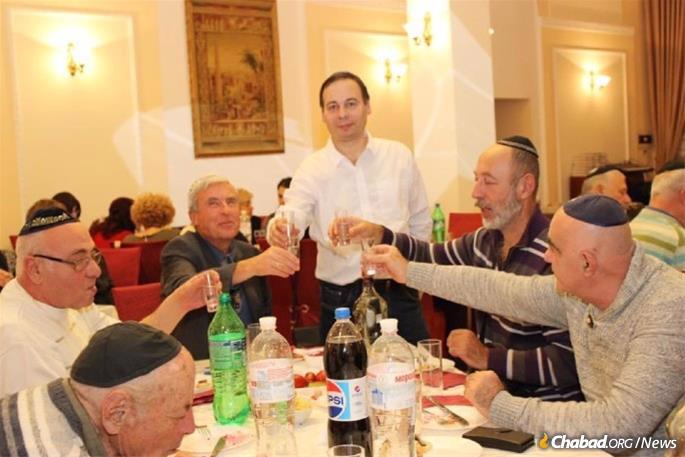
“I just hope that they’ll hear me,” he told me. “I want to tell them that I love them. I want them here. I will do anything I can to bring them here.”
A few days after I spoke with him, Michael’s wish came true. Miraculously, his parents escaped. They called from a Chabad rescuer’s phone; they were on their way out of Ukraine and would soon join him in Israel.
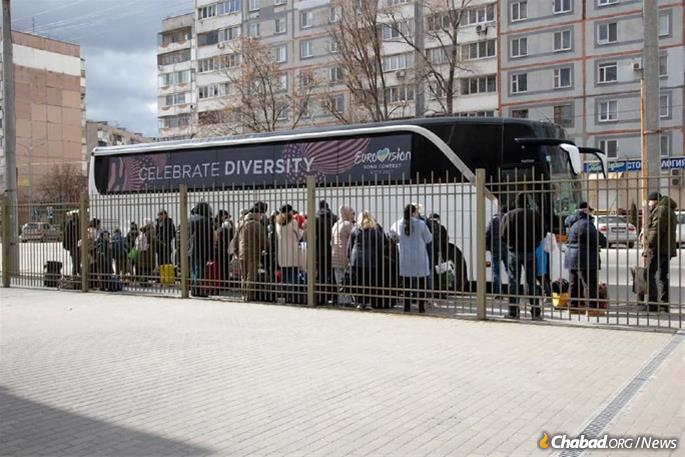
Sonia’s Harrowing Escape
I spoke with Sonia just hours after she arrived at her son’s home in Canada. She wants the world to know what is going on in Mariupol, but she also said that it was too painful for her to share publicly, and so she asked to stay anonymous.
Sonia was an English teacher in Mariupol, where she had grown up and raised her own children. She was a cornerstone of the Jewish community and felt at home whenever she was at Chabad.
In tears, Sonia began telling me how her city had been besieged—how there was no water, heat or gas, and barely any food. How they drank snow and made makeshift stoves outside to cook what little they had over an open fire. How her neighbor had gone outside to make food for her children, but was killed by a bomb before she could finish.
She and her husband were home when a missile crashed right into their house. Sonia ran to her husband, who had been sitting in a different room, and found that the walls and windows had collapsed onto him. She quickly pulled him out as the house caught on fire, and they ran outside.
It was 2:30 a.m., and the fire briefly lit up the night before their home of many years turned to nothing but rubble and ashes.
Sonia and her neighbors agreed that they had to go to a safer neighborhood. They heard that the center of town, where her daughter lived and near the drama theater, was still quiet. But Sonia’s husband told her he couldn’t do it; his heart and lungs were already weak, and were only getting worse. He begged her to go without him, but Sonia couldn’t. Finally, he agreed, and in a small group, they made their way.
Dodging through bombs amid freezing-cold temperatures, it took them three hours on foot until they found their daughter’s basement. Thirteen people were squeezed inside. Her daughter and son-in-law had already taken their kids and fled to Crimea.
It was quiet for a few days until the bombs found them again and started raining down on this neighborhood, too. The basement began filling with smoke; everyone had to run outside. There, they were told to lay flat as the bombs fell right and left, and they heard buildings crashing down.
Laying on the floor, Sonia looked around to find her husband. When she didn’t see him, she jumped up and ran back towards the basement, where she found him collapsed on the floor.
Sonia screamed for help, but everyone was too scared to move. Her husband was no longer breathing, and she couldn’t find a pulse. It was soon clear he was gone. For the first time in weeks, she broke down into tears, wondering if this was all somehow her fault.
A young boy ran over to her. “It’s too dangerous here,” he told her. “You have to go.”
The boy quickly helped her pull her husband’s body into a room, and gave her a paper and pen to write down his name, and place it on his body; a practice he told her was being done all around the city because going outside for burial was too dangerous.
There was no time for mourning. Sonia found her daughter’s mother-in-law, Klara, whose home was now also completely destroyed, and together they made the journey back to Sonia’s part of the city.
They arrived to find almost everything completely destroyed. Sonia described the shock of only seeing piles of rubble where all her friends’ and neighbors’ homes had once stood, and dead bodies lying in the streets.
A kind stranger invited them into their basement. He warned them that there were street battles going on, and the neighborhood was now too dangerous for them to stay. Sonia and Klara hadn’t slept or eaten in days; they hadn’t showered in weeks. After they rested for a few hours, the stranger brought them to the local hospital.
There, they learned that the Russians were allowing three small buses out per day, but many didn’t make it all the way, and the waiting list to get on one was thousands of people long. Sonia and Klara waited at the hospital for almost two weeks, but their turn never came. It seemed hopeless.
Sonia broke down again, saying all the prayers she knew.
“I also cried to the Rebbe,” she told me. “I said, Rebbe, help us! The Rebbe was born in Ukraine and sent many emissaries here. I wanted his help.”
Soon someone showed up in a van and told Sonia he had two spots at an exorbitant cost, but he was sure that the Jewish community would help her pay once he brought her to them.
Sonia convinced Klara to go with her, and in yet another harrowing journey, they were driven to the Jewish community in Zaporizhzhia, where Chabad gave them food and clothing, and a hotel room in which to shower and sleep for the night.
“I was so grateful to be Jewish,” said Sonia. “Here we were, with so many other Jewish people from around Ukraine, and people cared about us. They came to rescue us.”
The next morning, Sonia joined a bus to Dnipro, and from there, a bus out of Ukraine, to Kishinev, Moldova.
Her son immediately bought her a ticket to Canada, where they tearfully reunited.
“My son told me there is a Chabad center close by,” Sonia said. “I will feel at home there. I will go as soon as I can.”
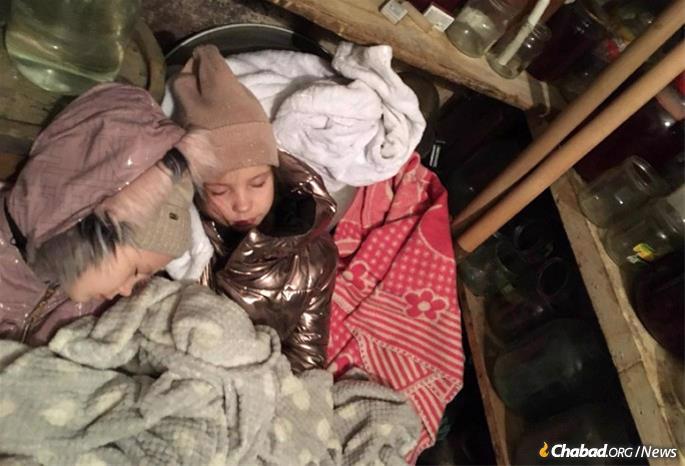
Rescues Continue
It’s been six weeks since Mariupol was first besieged, and the rescue efforts are only increasing. Aside from arranging the rescues and helping people resettle, Mendel and Esty Cohen are working to raise the funds needed to save each life.
“We just need the funds to get people to the big cities,” Rabbi Cohen explained. “Once they’re there, we have organizations who will sponsor the rest—the hotels and buses. But they can’t help us pay for the most dangerous parts of the journey, from Mariupol and its outskirts to the city.”
Their fundraising campaign has been filling up with caring people worldwide who want to help.
Rabbi Mendel Silberstein from Chabad of Larchmont and Mamaroneck, N.Y., says “when the war first broke out, we felt helpless. We wondered how a small community like ours can do anything. Then we realized that we can focus on helping one community, and in that way, make a difference.”
The Larchmont and Mamaroneck community rallied together and raised funds for Chabad of Mariupol. Some formed teams, including Sam Sorokin, who wrote: “Thank you for helping my cousin Boris and his wife escape, and for all the others that you have helped and will help.”
So far, $198,000 has been raised, saving many lives and sponsoring many rescue missions.
“What can we do to raise more funds today?” Rabbi Cohen texted me this morning. “We have beloved people relying on us.”
Donate and share, that’s what we can do, at: www.evacuatemariupol.com.











